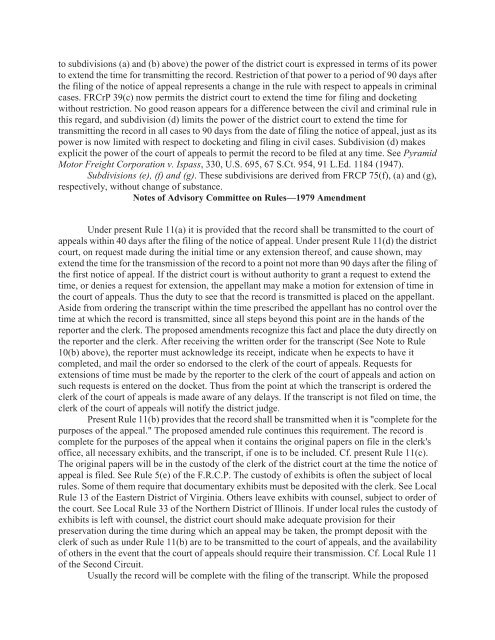Federal Rules of Appellate Procedure 2014-2015, 2014a
Federal Rules of Appellate Procedure 2014-2015, 2014a
Federal Rules of Appellate Procedure 2014-2015, 2014a
Create successful ePaper yourself
Turn your PDF publications into a flip-book with our unique Google optimized e-Paper software.
to subdivisions (a) and (b) above) the power <strong>of</strong> the district court is expressed in terms <strong>of</strong> its power<br />
to extend the time for transmitting the record. Restriction <strong>of</strong> that power to a period <strong>of</strong> 90 days after<br />
the filing <strong>of</strong> the notice <strong>of</strong> appeal represents a change in the rule with respect to appeals in criminal<br />
cases. FRCrP 39(c) now permits the district court to extend the time for filing and docketing<br />
without restriction. No good reason appears for a difference between the civil and criminal rule in<br />
this regard, and subdivision (d) limits the power <strong>of</strong> the district court to extend the time for<br />
transmitting the record in all cases to 90 days from the date <strong>of</strong> filing the notice <strong>of</strong> appeal, just as its<br />
power is now limited with respect to docketing and filing in civil cases. Subdivision (d) makes<br />
explicit the power <strong>of</strong> the court <strong>of</strong> appeals to permit the record to be filed at any time. See Pyramid<br />
Motor Freight Corporation v. Ispass, 330, U.S. 695, 67 S.Ct. 954, 91 L.Ed. 1184 (1947).<br />
Subdivisions (e), (f) and (g). These subdivisions are derived from FRCP 75(f), (a) and (g),<br />
respectively, without change <strong>of</strong> substance.<br />
Notes <strong>of</strong> Advisory Committee on <strong>Rules</strong>—1979 Amendment<br />
Under present Rule 11(a) it is provided that the record shall be transmitted to the court <strong>of</strong><br />
appeals within 40 days after the filing <strong>of</strong> the notice <strong>of</strong> appeal. Under present Rule 11(d) the district<br />
court, on request made during the initial time or any extension there<strong>of</strong>, and cause shown, may<br />
extend the time for the transmission <strong>of</strong> the record to a point not more than 90 days after the filing <strong>of</strong><br />
the first notice <strong>of</strong> appeal. If the district court is without authority to grant a request to extend the<br />
time, or denies a request for extension, the appellant may make a motion for extension <strong>of</strong> time in<br />
the court <strong>of</strong> appeals. Thus the duty to see that the record is transmitted is placed on the appellant.<br />
Aside from ordering the transcript within the time prescribed the appellant has no control over the<br />
time at which the record is transmitted, since all steps beyond this point are in the hands <strong>of</strong> the<br />
reporter and the clerk. The proposed amendments recognize this fact and place the duty directly on<br />
the reporter and the clerk. After receiving the written order for the transcript (See Note to Rule<br />
10(b) above), the reporter must acknowledge its receipt, indicate when he expects to have it<br />
completed, and mail the order so endorsed to the clerk <strong>of</strong> the court <strong>of</strong> appeals. Requests for<br />
extensions <strong>of</strong> time must be made by the reporter to the clerk <strong>of</strong> the court <strong>of</strong> appeals and action on<br />
such requests is entered on the docket. Thus from the point at which the transcript is ordered the<br />
clerk <strong>of</strong> the court <strong>of</strong> appeals is made aware <strong>of</strong> any delays. If the transcript is not filed on time, the<br />
clerk <strong>of</strong> the court <strong>of</strong> appeals will notify the district judge.<br />
Present Rule 11(b) provides that the record shall be transmitted when it is "complete for the<br />
purposes <strong>of</strong> the appeal." The proposed amended rule continues this requirement. The record is<br />
complete for the purposes <strong>of</strong> the appeal when it contains the original papers on file in the clerk's<br />
<strong>of</strong>fice, all necessary exhibits, and the transcript, if one is to be included. Cf. present Rule 11(c).<br />
The original papers will be in the custody <strong>of</strong> the clerk <strong>of</strong> the district court at the time the notice <strong>of</strong><br />
appeal is filed. See Rule 5(e) <strong>of</strong> the F.R.C.P. The custody <strong>of</strong> exhibits is <strong>of</strong>ten the subject <strong>of</strong> local<br />
rules. Some <strong>of</strong> them require that documentary exhibits must be deposited with the clerk. See Local<br />
Rule 13 <strong>of</strong> the Eastern District <strong>of</strong> Virginia. Others leave exhibits with counsel, subject to order <strong>of</strong><br />
the court. See Local Rule 33 <strong>of</strong> the Northern District <strong>of</strong> Illinois. If under local rules the custody <strong>of</strong><br />
exhibits is left with counsel, the district court should make adequate provision for their<br />
preservation during the time during which an appeal may be taken, the prompt deposit with the<br />
clerk <strong>of</strong> such as under Rule 11(b) are to be transmitted to the court <strong>of</strong> appeals, and the availability<br />
<strong>of</strong> others in the event that the court <strong>of</strong> appeals should require their transmission. Cf. Local Rule 11<br />
<strong>of</strong> the Second Circuit.<br />
Usually the record will be complete with the filing <strong>of</strong> the transcript. While the proposed


















